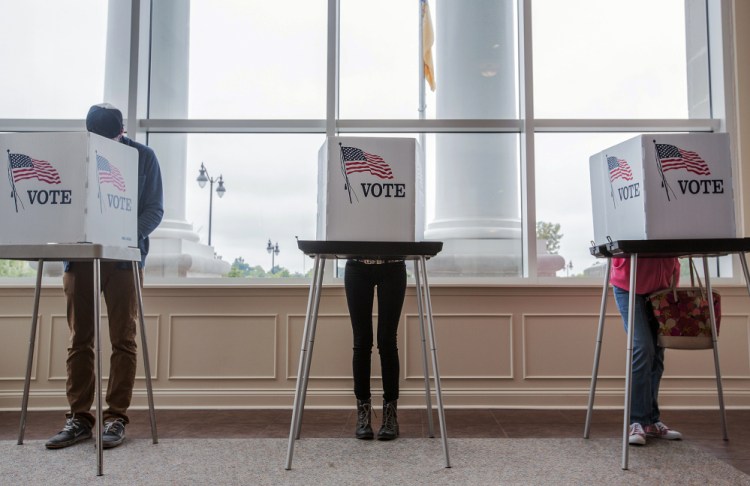WASHINGTON — Bernie Sanders won Oregon’s presidential primary and battled Hillary Clinton to a neck-and-neck outcome in Kentucky on Tuesday, vowing to soldier on as Clinton sought to blunt his momentum before her likely general election matchup against Republican Donald Trump.
The race in Kentucky was too close to call, but Clinton wrote on her Twitter feed: “We just won Kentucky! Thanks to everyone who turned out. We’re always stronger united.” With almost all the votes counted, Clinton held a lead of less than one-half of 1 percent as she tried to avoid ending the primary season with a string of losses to the Vermont senator.
In Oregon, Sanders led Clinton, 53 percent to 47 percent, with 61 percent of the precincts reporting.
Trump won the sole Republican contest, in Oregon, where Sanders was declared the winner shortly after the polls closed in the liberal-leaning state.
Rallying supporters in California, Sanders said he would end up with about half of the delegates in Kentucky and promised to press forward even though he would need to win about two-thirds of the remaining pledged delegates to end the primary season in a tie.
“Before we will have the opportunity to defeat Donald Trump, we’re going to have to defeat Secretary Clinton,” Sanders said to cheers in Carson, California.
Clinton holds a commanding lead of nearly 300 pledged delegates over Sanders and a dominant advantage among party officials and elected leaders known as superdelegates. The outcomes in Kentucky and Oregon did not dramatically change the delegate count and the former secretary of state remains on track to clinch the nomination on June 7 in the New Jersey primary.
Tuesday’s elections came as new questions about party unity were raised by a divisive state Democratic convention in Nevada. Supporters of Sanders tossed chairs and made death threats against the Nevada party chairwoman at the weekend event in Las Vegas, arguing that the party leadership rigged the results of the convention in favor of Clinton.
In a sign of the tension between the two sides, Sanders issued a defiant statement Tuesday dismissing complaints from Nevada Democrats as “nonsense” and said his supporters were not being treated with “fairness and respect.”
In California, Sanders urged the party to be welcoming to voters who are “prepared to fight for real economic and social change.” Addressing the party’s leadership, Sanders declared, “Open the doors, let the people in.”
Trump picked up nine delegates earlier Tuesday in Guam, which held its territorial convention in March, and had 1,143 delegates heading into the Oregon contest — fewer than 100 delegates short of the 1,237 he needs to clinch the nomination.
For Democrats, 55 delegates were up for grabs in Kentucky and 61 delegates were at stake in Oregon. Clinton and Sanders will each pick up at least 25 delegates in Kentucky, with five delegates remaining to be allocated pending final vote tallies. In Oregon, Sanders will receive at least 28 delegates and Clinton at least 24, with the remaining delegates awarded according to vote tallies.
The Sanders campaign did not immediately say whether it will challenge the results in Kentucky, which does not have an automatic recount.
In Kentucky, Clinton visited black churches and a small-town diner, and held rallies on Sunday and Monday in an effort to break up Sanders’ momentum after his recent victories in Indiana and West Virginia.
Clinton’s husband, former President Bill Clinton, was the last Democrat to carry the state in a presidential election — he won Kentucky in 1992 and 1996 — and the former first lady tried to emphasize those ties in the days leading up to the primary.
“I’m excited about the primary but we’ve got to turn a lot of people out,” Clinton told the crowd at a packed diner in Paducah, Ky., on Monday. “I’ll tell you this. I’m not going to give up on Kentucky in November. I want to help to bring back the kind of economy that worked for everybody in the 1990s.”
Nearing the end of a long primary slog, the two Democratic candidates are preparing for June 7 primaries in California, New Jersey and four other states and then the District of Columbia primary on June 14. When pledged delegates and superdelegates are combined, Clinton is now about 96 percent of the way toward securing the Democratic nomination.
Send questions/comments to the editors.


